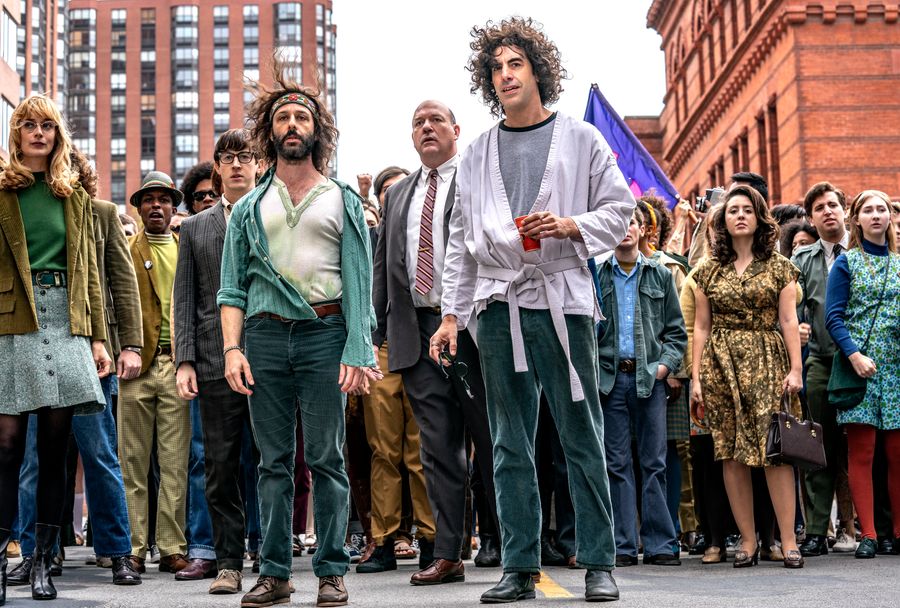Stained by the ignorant political tenure of Donald Trump labelling the peaceful Black Lives Matter protesters as ‘thugs’, the turbulence of a monumentally significant 2020 has spilt out onto the history books of early 2021 as issues of free speech and a right to orderly protest have been questioned. A cauldron of sociological discourse continues to stir, fueled by the sheer lack of institutional change despite the quite obvious need for it. The story of the Chicago 7, a group of protestors unfairly put on trial in 1969 following a violent clash with police whilst protesting, is one that couldn’t be more pertinent to the injustice of today’s reality; therefore, the film’s dilution of the real-life incident may well be a worthy sacrifice to resonate with a broader audience.
Eddie Redmayne, Sacha Baron Cohen and Jeremy Strong make up the most notable stars of the defending Chicago 7, a hodgepodge group of loosely interconnected individuals each on trial for an alleged ‘intention to incite violence’. They’re joined by the prosecution headed by the lesser-spotted Joseph Gordon-Levitt as an altogether more libertarian Richard Schultz, described as a ‘pit bull’ of the government during the actual trial. This nicely illustrates writer and director Aaron Sorkin’s intentions, more interested in portraying a political rally-cry to contemporary audiences, rather than an accurate reflection of the actual trial.
Taking off their judicial robes worn in protest by Abbie Hoffman and Jerry Rubin in real life, they reveal beneath crudely-made police uniforms, a powerful, shocking political statement diluted into pantomime upon research that the uniforms weren’t actually worn underneath. This moment, and many like it that are littered throughout the courtroom drama, certainly creates a rousing political tale with all the stereotypes of real-life panto, from the heroic liberal patriot Tom Hayden to the villainous and genuinely unpleasant judge Julius Hoffman. A tight, if somewhat leaky script from Sorkin, is elevated by these lengthy courtroom sequences, making the heavy court-of-law discourse palatable, even thoroughly entertaining.
Though it is what is sacrificed and discarded by Sorkin in the process of chopping the film into consumable chunks, that is the film’s most significant shortcoming. The role of Bobby Seale (played by Yahya Abdul-Mateen II), co-founder of the Black Panthers, who really made the group into the Chicago 8, is unfortunately minimised as the film progresses, phased-out in favour of the larger trial despite the shocking gravitas of the activist’s real-life story. Indeed, his experience deserves a movie of its own, as following several charges of ‘contempt of court’ he was gagged and bound by chains to his chair in a despicable act of racial injustice that lasted several days of trial. Though in Sorkin’s film, this act lasts for no longer than a few minutes, undermining the real-life ordeal Seale experienced.
The dilution of the material does, in principle, make sense, with stellar performances from Eddie Redmayne and Sacha Baron Cohen morphing the material into a riveting, entertaining think piece, rather than a dull slog of a real-life political trial. Whilst Cohen is tipped for Oscar success for his portrayal of Abbie Hoffman, it is rather Eddie Redmayne as Tom Hayden who deserves the golden acclaim, a deeply emotionally-driven character in conflict with his own interests. Cohen’s comedy wings are clipped, though he does excel as the wildly eccentric Hoffman, save for a few glitches in his American accent.
A stirring political drama and portrayal of the Chicago 7, Sorkin’s film is an excellent gateway into the extensive accounts of social injustice that pepper American history, here telling a pertinent story to those unfamiliar with the original trial. For those with knowledge of the 1969 case, this is a simple reminder of the dangers of undisputed social inequity, a dramatisation of the actual trial bookended by some needless self-indulgent flag-waving.
